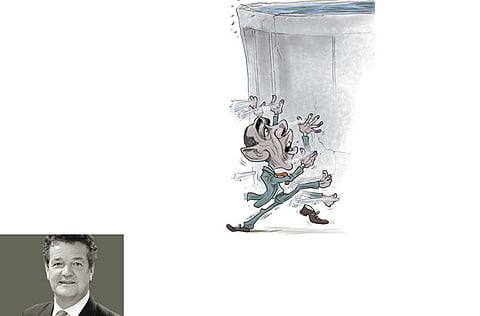US-led sanctions will fail to force change in Iran
Sanctions target the middle class; the elite can dodge the restrictions

The American–led sanctions on Iran are hitting the Iranian economy hard, but do not look likely to succeed in their declared aim of changing Iranian policy. In addition, any undeclared hopes the Obama administration may have had that the sanctions would build popular support inside Iran to help change the regime, have backfired badly.
Iran is certainly dealing with a major crisis as the rial fell 40 per cent in last week, having already fallen a previous 50 per cent over last year. But as long-term commentator on Iran, Robert Dreyfuss, summed it up: “It’s not a revolution yet” even though the collapse of the currency is likely to plunge further, causing local prices to skyrocket all over Iran and force Iranians to scramble to find hard currency.
In addition, the sanctions have savaged Iran’s oil exports, which once were about 4 million barrels per day, and today are about 1 million barrels per day. This vast hole in Iran’s foreign exchange earnings means that Ahmadinejad simply cannot find the money to support his chaotic economic regime of subsidies. In addition, unemployment is up to maybe 25 per cent plus, and quite a bit higher in some of the poorer parts of the country.
But all this economic chaos will not lead to change. As Dreyfus puts it, Iran is not a democracy, so the government is able to suppress any agitation in support of rebuilding ties with the mainstream global world from supporters of politicians like former president Hashemi Rafsanjani (who wants a less confrontational foreign policy), or the Green Movement (which was brutally attacked after doing well in the 2009 general elections), or even the powerful, bazaar-based business class.
All these groups are very concerned about the rial’s free fall, as the official rate of 12,260 to the dollar is restricted to very few essential goods and a very few favoured categories of importer; vies with other official rates of between 26,000 and 29,000 (which will have fallen further by the time you read this column) depending on what goods are being imported and who is doing the importing; and free market rates close to 50,000.
Dreyfus sees three possible scenarios: One is the sanctions causing true political upheaval that forces Khamenei to change course, or even collapses the Islamic Republic’s regime. Two is that the current discontent spreads, but is contained by the regime. And three is that an increasingly unstable regime launches some sort of military adventure or even speeds up its nuclear programme.
Dreyfus is clear that the first scenario is almost impossible, and the third is very unlikely since the Iranian leadership is neither suicidal not deranged. Therefore he foresees some variant of the second scenario, in which moderates and those advocating a compromise with the West are sidelined even further, especially in the run-up to the 2013 presidential elections in Iran next June.
An indication of how this is already happening is the way the hardliners have unleashed a torrent of criticism aimed at Rafsanjani, the powerful former president, and in recent weeks both his son Mahdi and his daughter Faezeh — both politically active — have been arrested. Recently, Rafsanjani has called for a “unity government”, and he and his allies have quietly floated the idea of better ties with the US, according to Iranian sources.
Another respected commentator on Iran, Farideh Farhi, also agrees that the US-led sanctions will not work, based on the central incoherence of the sanctions which seek to change the behaviour of Iran’s leaders but in fact do not affect them, while they bring harm to those who might bring about internal change.
Farhi quoted Virginia Tech economist Djavad Salehi-Isfahani and James Ball in the Washington Post who pointed out that the sanctions threaten Iran’s middle class and private sector which want better relations with the global world. But those in power have enough means to get round the restrictions and find the currency they need, as well as access the instruments of repression in order to stay in power.
Farhi savages the sanctions on the basis that they will fail to achieve change, but will also do deep damage to Iran’s social fabric, economy, and the private sector. Farhi takes issue with the naive American assumption that “freedom-loving Iranians will find a way to foment change in Iran and aim it in a favourable direction for the US despite the US making their path more difficult, just because of their incredible desire and energy to be free”.
Sign up for the Daily Briefing
Get the latest news and updates straight to your inbox



